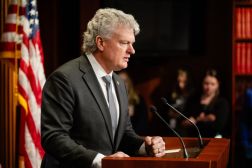Here are the agency officials leading AI deployment under Trump

The requirement for agencies to designate a chief AI officer is among the policies that the Trump administration has carried over from its predecessor, reemphasizing the importance of agency leaders who are focused on the technology.
CAIOs were first required under the Biden administration as agency stewards of the technology, though the position also has early roots in “responsible AI officials” established under the first Trump administration. In an April memo replacing Biden-era guidance, Trump’s Office of Management and Budget opted to re-up the requirement for agencies to designate a CAIO. Those officials were required to be named in early June.
While a list of CAIOs was previously publicly available under the Biden administration on AI.gov, that list is no longer public. As a result, FedScoop sought to collect an updated roster of officials, focusing on AI leaders that sit on the White House-led CAIO Council. Through agency spokespeople, officials, and publicly available information, FedScoop has identified 17 of those roughly two dozen officials.
That group is a mixture of seasoned AI chiefs as well as some new faces.
The requirement to designate a top AI official broadly applies to a wide range of agencies, but CAIO Council membership is guaranteed only for AI leaders at agencies that fall under the Chief Financial Officers Act, per OMB’s April memo (M-25-21). That group traditionally includes 24 agencies — though one of them, USAID, has since been absorbed into the State Department under President Donald Trump.
Newer officials in the mix include Treasury’s Paras Malik, who is also the counselor to the secretary, and the Department of Energy’s Conner Prochaska, who is nominated to lead the agency’s Advanced Research Projects Agency-Energy (ARPA-E). Several department-level CIOs installed under Trump have taken on the AI responsibilities as well, such as the Office of Personnel Management’s Greg Hogan, the Small Business Administration’s Hartley Caldwell, and Health and Human Services’ Clark Minor.
Minor’s designation as acting CAIO comes after Peter Bowman-Davis apparently left the agency. Bowman-Davis was a Yale undergraduate student when he was selected to serve as acting CAIO of the department, Politico reported at the time. But recently, Minor was listed as acting CAIO on HHS’s website and Bowman-Davis is no longer in the HHS public directory.
The National Science Foundation similarly had a recent change in AI leadership after Dorothy Aronson, its former CIO, who more recently served as CAIO, left the agency. According to a spokesperson, Aronson left in May and Thu Williams is currently serving as acting CAIO.
But the current roster includes many officials who have held CAIO roles since the previous administration, too, such as Department of Agriculture CDO Christopher Alvares, Commerce CIO Brian Epley, Veterans Affairs CTO Charles Worthington, and General Services Administration Chief Data Scientist Zach Whitman, and among others.
During the Biden administration, many of the designated CAIOs were “dual-hatted,” meaning they had another job at the agency in addition to the AI responsibilities. Generally, those other roles were tech or data related, and that trend hasn’t changed.
Of the 17 identified officials, five are also serving as the chief information officer, five are serving in data leadership roles, and three are also the chief technology officer. Others either appeared to be serving as CAIO only or had more unique additional responsibilities, such as Malik and Prochaska.
With several agencies, however, AI leadership still isn’t clear.
The Departments of Housing and Urban Development, Homeland Security, Education, and the Social Security Administration didn’t respond to multiple requests from FedScoop to identify their CAIOs. Meanwhile, the Justice Department and Department of the Interior declined to share the names of their officials. The White House also didn’t respond to a request to identify CAIOs at the missing agencies.
CAIOs and the council are important players in the Trump administration’s AI efforts, particularly for agency plans to address the technology and departmentwide collaboration. Trump’s July AI Action Plan recommended formalizing the CAIO Council as “the primary venue for interagency coordination and collaboration on AI adoption,” and agencies have several upcoming deadlines on plans for the technology.
By the end of September, agencies are required to publish strategies for removing barriers to the technology as well as compliance plans, which are required by the AI in Government Act of 2020. And by late December, agencies must develop a policy specifically focused on generative AI and review how their internal IT, data, and cybersecurity policies align with the OMB memo, executive orders, and statute, and make updates if needed.






